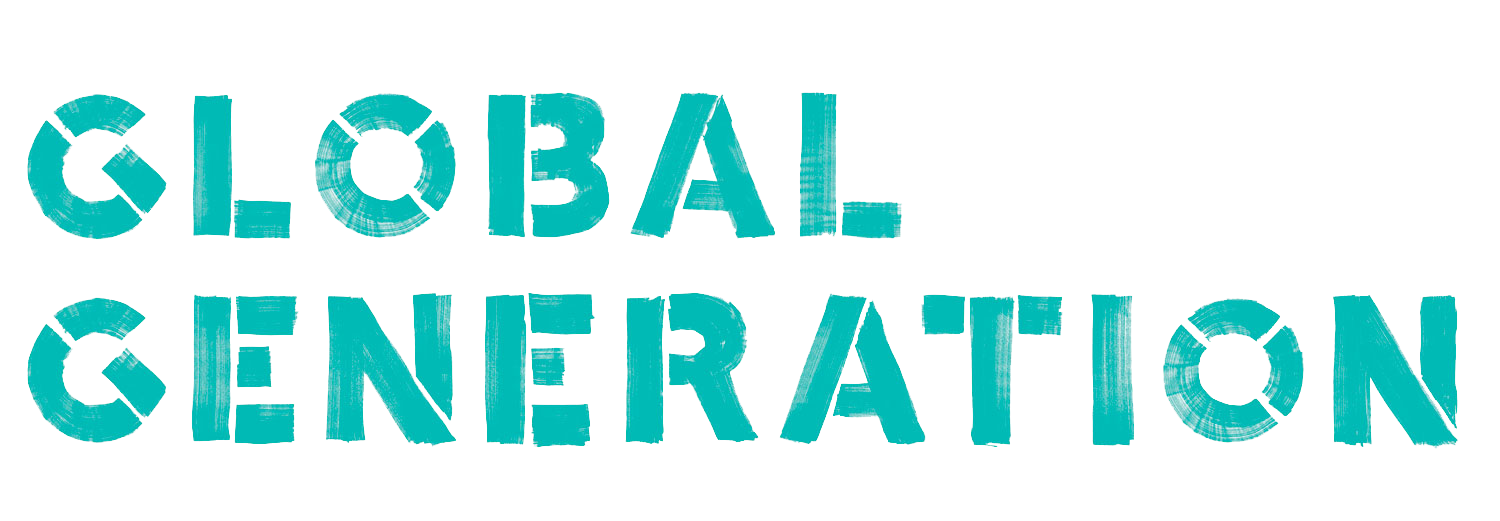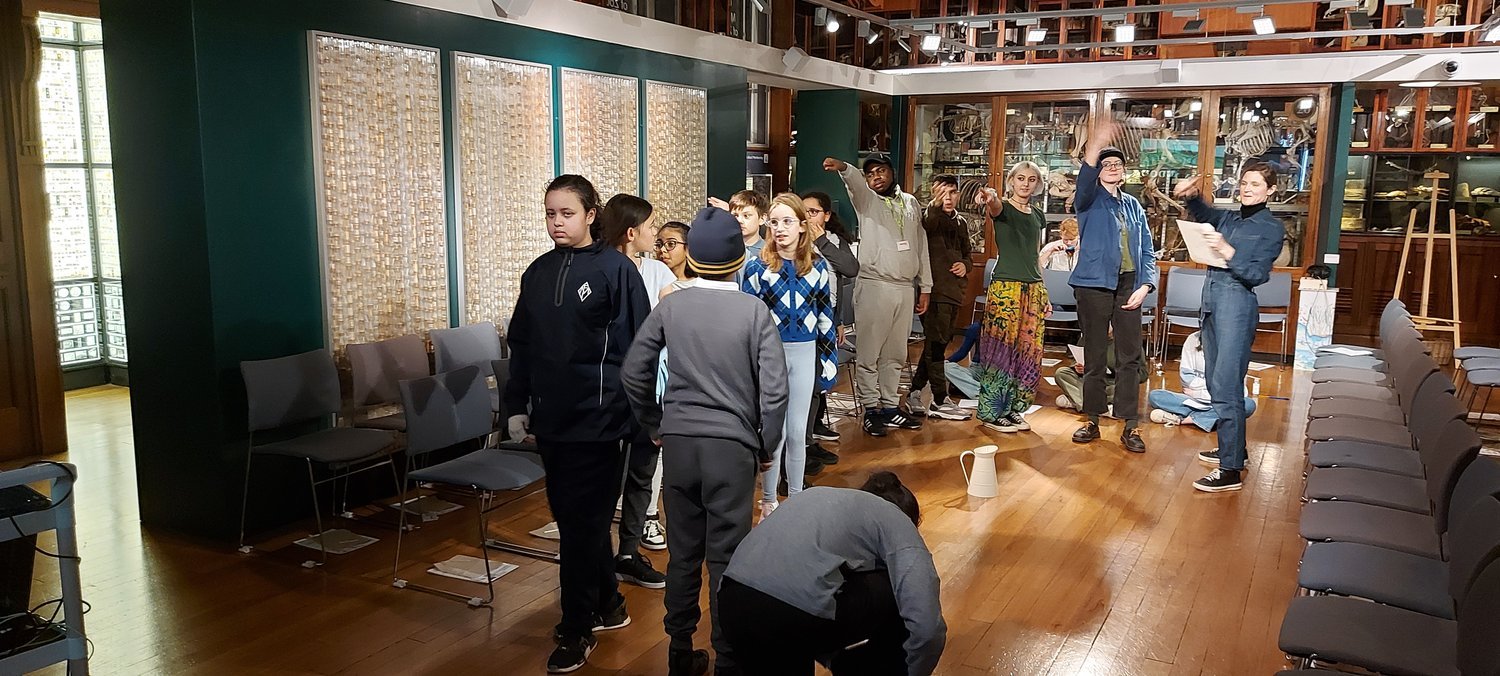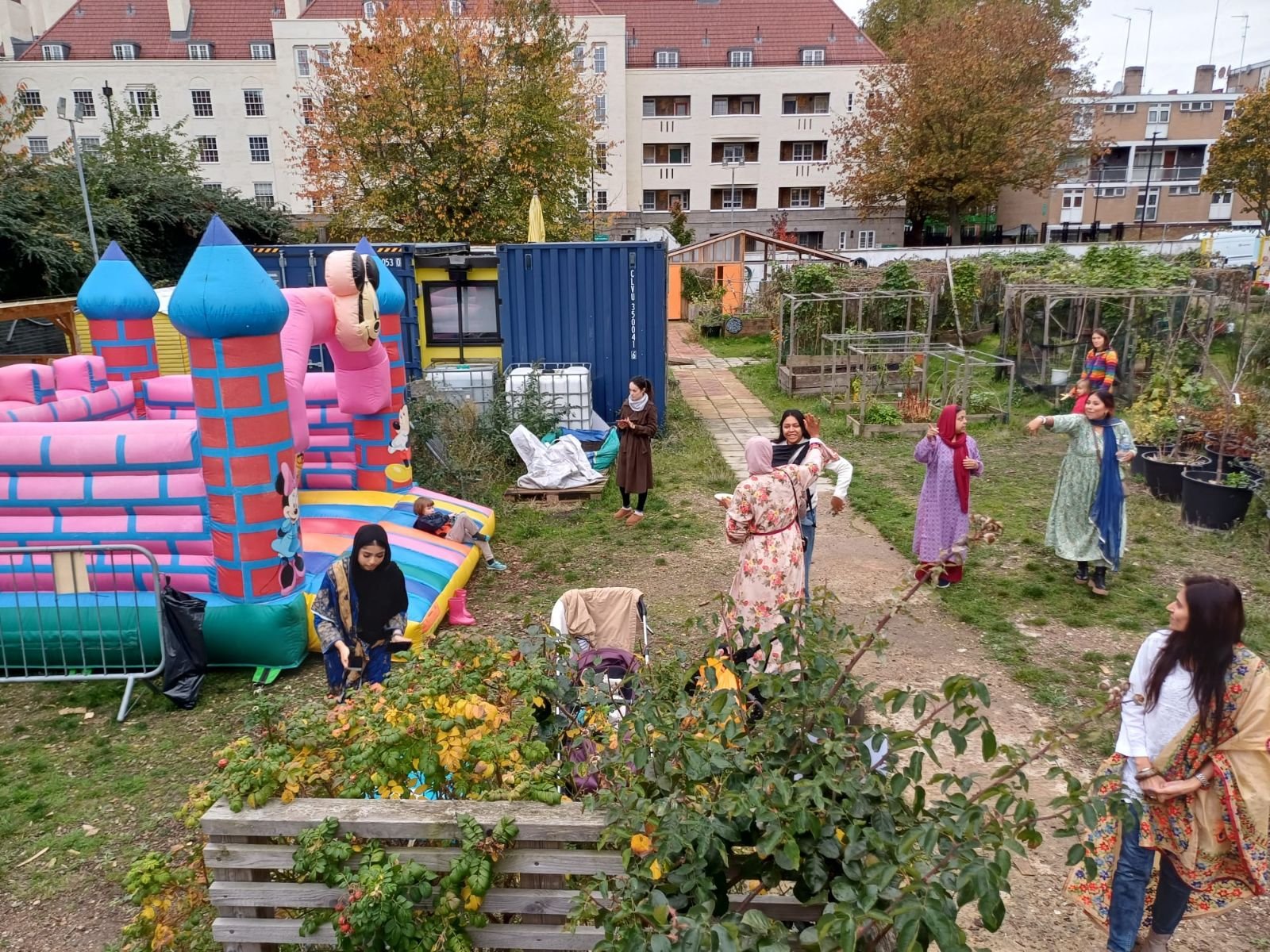Amongst the busy London streets lay creative activism
In this piece Maroua shares her experience as a young Global Generation Fellow who participated and supported younger children in a Voices of the Water performance as part of UCL Cultures ‘Performing Planet Activism’ Event.
It’s evening on London’s grey streets lined with brick buildings in a cold and dark February. Everyone is just trying to get through the winter. Business days as usual, strikes and planet activism thrives and in a little side corner, escaping the busy Euston road, lies a museum; one which you would not recognise straight away. It is the Grant Museum of Zoology. Inside the Victorian hospital architecture are a group of young people invited by UCL Culture to contribute to a 10 day event called Performing Planet Activism. Through a series of workshops and events showcasing art, research and activism, ‘Performing Planet Activism’ focussed on bringing awareness to the pressing issues around the climate crisis.
The lights dimmed at 7pm in a room filled with skeleton heads, bones, old wood and the combined smells of museum musk and artificial cleaning fluid. Children and young adults lit up the central space. They were dressed in green, blue and grey; colours that represented the dragon Taniwha who has become an inspiration and a symbol for Global Generation’s Voices of the Water Project. The Taniwha came to us from Jane Riddiford. With permission of a Māori elder she shared with us a story of the taniwhas of Aotearoa New Zealand. There was a big water jug in the middle, ready to be filled with the words and stories from young people expressing their relationship to water and the planet. The young leaders of the group, who we call The Fellows, told personal stories. My Favourite came from Cassie who recalled her mothers’ relationship to water in the Philippines. She described the power of water to heal the mind and body. Beyond its practical uses I found it moving to hear about and feel the respect and nostalgia water can evoke.
Our performance was carried by the chirpy voices of Generators, the younger performers along with Fellows telling the story of the River Fleet in King’s Cross London. We learnt that once upon a time the Fleet was full of life. The young Generators scrunched up pale pieces of paper which they turned into fish. With fish in hand the performers swam and danced around the room.' As the paper fish faded we were reminded of how the waters of the Fleet had been covered over and the fish became extinct. The finale focussed on Taniwha; each young person gently picked up colourful ropes which we wove together using up-cycled textile. Suddenly in the middle of the stage a magnificent dragon’s tail came to life. Floating above the Fleet it was both tail and landform. At this point the audience were invited to share their feelings about the climate and our future.
In making the performance young children and young adults came together alongside Naomi Frederick, an actor from Theatre Complicité who helped us to collaboratively devise what we felt was important to communicate. I am used to writing poetry, however working with children is something I found more challenging. Instead of indulging in self pity I had to dig into positive memories; water carried me back home to Algeria.
Maybe it's an adult thing but I found the children's lively energy different from my anxiety and worry about the performance. It was heart-warming being with them as they rehearsed. They were full of curiosity and suggestions about how to improve the performance. It gives me hope for the planet to see how young people can give so much passion and energy to create a better future.
I learnt a lot about myself through participating in the performance. Moving my body in the way that Naomi taught me was grounding. It was compelling the way she showed me how to place my two fiddly feet and feel the ground balance me. I learned to connect with my body, speak steadily, maintaining control and awareness while also allowing myself to get lost in my words as I told my story about water. I loved hearing the audience participate; witnessing older generations from many cultural backgrounds have their say through their water stories and their perspectives on the planet reminded me that we are all one.
The little snippet that we created connected across generations and reminded us that planet activism is also about care and creativity.
Child like state
Here are two tales
But this is not one for the gaze to interpret as suffering
Or of a particular agenda
These are memories of a pure childlike state
First encounters
I could start with a long long time ago in a village
But this is not an exotic story
There’s a girl and many other children
Naïve to the offerings and ways of their home country
Unaware
Eyes masked with childlike visions
There is no sound of streaming water
Only the clicketing
Clacketing
Of metal pots in the distance
The heat eloping Grandma’s garde
Peeping through the deep saffron pomegranates and the drooping jasmines
Are the box of bottles
Caps spread everywhere
Grandma says “the water has come go fill up as much water as you can”
This is not a developing world narrative
These are memories of a pure childlike state
The girl and the crowd of curiously eyes children,
Fuelled with wonder
Run
The yellow and blue mosaics on the wall blur and all is blended as the children run
To the local fountain mosque
The water gushes gargling
Dancing and prancing onto the children’s loose patterned tunics
Squeaky glees
As the water pours endlessly
Bringing life to the rusty canned bottles
Decorating it with life as the children fill them up and run back to Grandmas
Back and forth
Giggling,
Getting wet
Becoming a wholesome memory
Now is time for the other side of the tale,
The interlinks of childhood and teenhood
The seas of Algerie
The first step into the ice biting deep blue tank of salt
The first splash
As the orange ball rests above the glittering specks of azure and silver
There’s splishing and splashing
Children smiling and laughing
Men in white tunics and sandy feet carrying plastic green bags full of golden tea
Like the village and the fountain mosques waters
The sea is a life source
Of happiness, content , relaxation
And as the girl and children
Blossom into adolescents
Thorns growing as they develop
Algerie’s seas become a reminder of home












Meet our second cohort of earth build trainees! Their focus has been on all things wood, including green woodworking and the timber construction of the kitchen. They have learned on the job, while working on our sustainable natural build construction project to create our first permanent community garden, at the #TriangleSite.